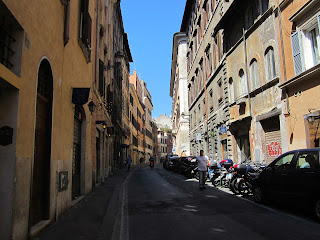Apartments, SIM Cards, and Spanish Residency
After having lived in Spain for just about 8 months now I'm beginning to struggle with the idea of leaving and not coming back. Despite economic crisis and high unemployment (currently at 25% across the board and 59% in youth--meaning less than half of Spanish students currently enrolled in college will not get a job), the inevitable language barrier, and a general lack of urgency that seems to haunt the culture itself, I find I'm less than excited about returning home. Maybe it's just the thought of uprooting myself yet again, which, given the nature of the Suffolk Madrid program, I knew would be part of the bargain. But there's something about Madrid that I think I'm going to miss; maybe it's the juxtaposition of history and cosmopolitan ideals, or the down-to-earth grocery stores, or the laid-back lifestyle, or the weather, the nightlife, the language, the people, the streets. Somehow I feel as if I've only just gotten the hang of Madrid, and now I have to revert back to a way of living I'm not entirely I want to return to.
Personal problems aside, being enrolled in Suffolk Madrid has given me a bit of insight into the necessary procedures for residency here. In order to stay in Madrid past the expiry of a given visa, you must obtain a tarjeta de extranjera, or DNI, or the equivalent of the Green Card here in Spain. You have to present a number of documents to the Immigration Agency, including your passport, complete with a stamp indicating your date of entry, paperwork detailing that you have adequate funds to support yourself while in Spain, a certificate of empadromiento (which, from my understanding, more or less registers you in the Spanish immigration system via your address), and a few other items of note. Granted, the process is different depending on whether you're seeking residency as a student or as a potential employee, and it's in your best interest to have a solid understanding of Spanish in order to navigate various appointments, websites, and other bureaucratic measures.
There's more to living in Spain, however, than simply having a residency card. Finding an apartment, getting a cell phone, and even finding a job are all challenges foreigners face upon emigrating to Spain. There are multiple websites that cater to those looking to rent apartments in Madrid, with rates as low as 200 or 250 euros per month (granted, such apartments are usually about an hour commute away from the city center). Obtaining a SIM card--or a phone itself, depending on whether or not your US phone is unlocked and/or internationally compatible--is as easy as walking into any cell carrier store and speaking with a representative. For native English speakers, there are a multitude of agencies that provide short-term TEFL (Teaching English as a Foreign Language) training programs; you can sign up online for month-long courses, and tuition fees range between 1000 and 1500 USD. Much like with the residency card, however, a strong foundation of the Spanish language is almost imperative for these goals, not to mention successful integration into Spanish society. If, after a semester or two abroad, the thought does strike you to pursue Spanish residency, the most important thing to focus on is the language--after that, provided you have the resources and the desire, everything else is a matter of navigating Spanish bureaucracy.































